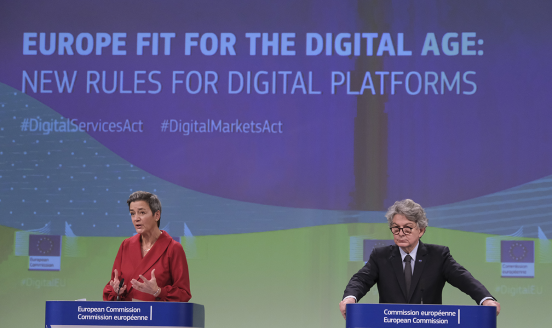Microsoft fined for non-compliance: a game-changer in antitrust settlements
The European Commission has crossed into new territory. For the first time, it has sanctioned a company for not abiding by an antitrust settlement: a
The European Commission has crossed into new territory. For the first time, it has sanctioned a company for not abiding by an antitrust settlement: a €561million fine imposed on Microsoft for not keeping to promises made by the company back in 2009 (see the Commission press release).
Background. The case is one of the last outstanding issues stemming from the clash between the Commission and Microsoft that started in the early 2000s, when the company still faced little or no competition in computer-related markets. Microsoft was accused of tying its internet browser Explorer to Windows, de-facto leveraging its dominance in the operating systems market in order to protect or extend its power in the browser market. This practice is sanctionable by a fine of up to 10% of Microsoft’s global turnover under Article 102 of the Treaty on the Functioning of the European Union.
Microsoft originally escaped the fine by entering into a settlement with the Commission. Under the terms of that settlement, Microsoft had to provide computer users with a ‘ballot screen’ so that they could compare all major potential available alternatives and choose whether to stick to Explorer or swiftly switch to another browser (see Ms Kroes announcement at the time). That gave enough confidence to Microsoft’s competitors that a level playing field in the browser market was restored. However, between May 2011 and July 2012, the ballot screen did not pop up in Windows 7 – service pack 1. Today’s Commission decision punishes this as an infringement of the settlement agreement.
The significance of this fine goes far beyond the Microsoft case. As I mentioned already in a previous Bruegel blog post (European antitrust fines: a new wave of deterrence?), levying fines in antitrust is mostly about sending signals to discourage companies from breaching antitrust laws in the future. Companies refrain from entering into cartels or abusing their dominant position if what they expect to gain (ie the additional profit with respect to a counterfactual scenario in which they compete fairly) is less than what they expect to lose (ie the fine imposed by the antitrust authority if the illegal activity is discovered). The question is then: does it make sense to offer a company that allegedly caused harm to consumers an easy way-out, such as a settlement with no accessory fine entailed, as was the case with Microsoft in 2009?
Costs and benefits of settlements. From an economic perspective the answer is not straightforward. First, there is a risk that a settlement as opposed to an immediate fine will reduce deterrence by reducing the expected costs associated with the abuse. If I know that Almunia will offer me a chance to settle, why not breach competition law, reap the benefits today and then go back to competition after the settlement is done? Second, by definition, the settlement is a compromise. So there is a chance that not all outstanding issues will be sorted out, particularly because a settlement comes after a preliminary assessment by the Commission (in the form of a statement of objections), and issues that would have been tackled in a final infringement decision might not yet have been identified at that stage of the process. Third, and perhaps most importantly: with a settlement the strength of a case cannot be fully assessed, since it is extremely unlikely that a settlement would end up in court, and it leaves no legal precedent, reducing the chance to provide guidance to industry on the antitrust treatment of novel issues, leaving unaltered the likelihood that the same problem will occur again in the future. A settlement cures the symptom, not the illness.
However, settlements have juicy counterbalancing features that perhaps can explain their increasing popularity in EU antitrust proceedings. In dynamic industries (such as ICT), timing is critical. A settlement allows quick identification of the issue and the introduction of a correction in the market in order to restore normal competitive conditions almost immediately. The life-cycle of an antitrust proceeding may often outlive that of a computer or a tablet. It would be of little consolation to consumers to overpay for a product for years and then witness the levying of a huge fine in relation to a product they do not use anymore. A settlement also acts at once against the source of extra profit arising from the abusive conduct. In the case of antitrust proceedings with no settlement, that may not happen: the abusive conduct may be perpetrated until the final decision is taken. Therefore, even if it may reduce the expected costs associated with abusive conduct, a settlement can nevertheless reduce its expected benefits.
In addition, a settlement may not run the risk of overlooking outstanding issues if the proposed commitments are properly market-tested before the settlement decision is taken. In that sense, given the level of uncertainty at the time of the statement of objections about the nature and the relevance of the factors that led to the abuse, a settlement may offer an opportunity to the Commission to minimise the risk of future anti-competitive behaviour by imposing the acceptance of conditions that are designed to open the market. For example, in the case of an antitrust abuse in the airlines industry, a settlement package may entail the release of slots at important airports in order to favour entry and reduce the likelihood of a future abuse of dominance. In a way, this means that post-settlement, a company’s profit may be lower than what it would have been if the abuse had not been perpetrated in the first place. This may provide enough discouragement so that the possibility of a settlement in case things go bad and an antitrust investigation is launched would not alter a company’s incentive to breach antitrust laws.
A game changer. Crucially, the balance between the costs and benefits of a settlement depends on the credibility of the commitments. If the commitment is really implemented and is capable of bringing the market back to competition from day 1, going for settlements can certainly have a positive effect on general welfare. Guidance on the treatment of novel cases can still be given through dedicated guidelines; meanwhile the abuse is stopped and customers are better-off.
But checking compliance with commitments is a difficult task, especially when commitments do not entail structural divestments but rather specific conduct on the part of the dominant company: this may be very difficult to monitor, particularly at a time in which the Commission is struggling with declining available resources. But if non-compliance entails little risk of incurring significant costs, the whole credibility of the settlement as a welfare-improving tool is questionable. In that light, Almunia’s decision to sanction for the first time a company for non-compliance with a settlement has a clear motive. Almunia cannot increasingly rely on settlements for his antitrust investigations without being certain that those settlements will effectively right the wrong that prompted the investigation (see the most recent examples: E-books, Thomas Reuters, Rio Tinto Alcan). One of the most important high-profile cases currently on Almunia’s agenda, the Google search-bias case, is expected to end up in a settlement after the Summer. In the context of a similar case, Google recently settled with the Federal Trade Commission in the US. However, in the US, Google made non-binding commitments that generated harsh criticism about the effectiveness of the remedy, should it be needed (see, for example, the concurring and dissenting opinion of Commissioner Rosch). In addition to remarkable differences in the substance of the settlement, the Commission take on the Google case will therefore be likely to have a significantly different impact than in the US.
Today’s Commission decision on Microsoft implies that should Google decide to enter into a settlement with DG Competition, it will have to exert extra care to not give the impression that it is deviating from the commitments that such a settlement will entail. The potential price to pay for sending the wrong signal is a fine up to 10% of the company’s global turnover.



